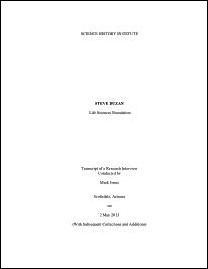Research interview with Mike Bonney
- 2015-Jun-14
Research interview with Mike Bonney
- 2015-Jun-14
Mike Bonney was born in Massachusetts and spent his life between his birthplace and Maine. His father was a commercial banker and was the CEO of the largest bank in Maine. From a young age, Bonney aspired to become a physician, inspired by the news of the first successful heart transplant done by Christiaan Barnard. He attended Bates College in Lewiston, Maine, where he was able to do an internship for a food and drug retailer through an endowment program. After graduating, Bonney was hired at the supermarket chain Hannaford Brothers. He did a training program with them to learn how to run a drugstore, after which he was assigned to a store in Bangor, Maine to be their store manager and raise their gross margins. Not wanting to continue his work in retail, Bonney left Hannaford Brothers and was later contacted by Steward Pharmaceuticals about a sales position. Bonney accepted the job and relocated his family to Wilmington, Delaware. With Steward, Bonney trained new representatives and managed their antibiotic, CNS, and inflammation immunology portfolios. He later began working with Zeneca and Abbot Laboratories on some of their drug launches, such as Seroquel with Zeneca, as well as established new accounting systems, software, and training programs.
Bonney was contacted by a headhunter in Boston, Massachusetts asking him to interview for the Vice President of Sales position at Biogen. Unfamiliar with biotechnology companies, Bonney interviewed anyway and accepted the position. His first project was to develop and launch Avonex, a drug that treats multiple sclerosis. Bonney set up a phone line for patients to call if they had questions about the drug, as well as for nurses and doctors for training purposes. The launch of Avonex was a major success for Biogen, and Bonney was reassigned to Europe to develop infrastructure and launch medications there. He was promoted to the chief commercial officer but retired in 2001 after feeling he was no longer developing professionally in his job. Bonney devoted his time to his family and non-profit work before deciding to reenter the corporate world. He began working for Cubist Pharmaceuticals as the chief operating officer. The company was running pneumonia studies in hopes of developing an antibiotic, which ultimately failed. This caused Cubist’s stocks to plummet, and Bonney and his staff began reviewing their data to understand why the antibiotic had failed. They determined that their antibiotic would work if administered intravenously, leading to the development of Cubicin. Bonney became Cubist’s CEO after their previous CEO’s cancer diagnosis. Cubicin was finally launched in November of 2003 and was the most successful IV antibiotic launch at that time.
| Property | Value |
|---|---|
| Interviewer | |
| Interviewee | |
| Place of interview | |
| Format | |
| Genre | |
| Extent |
|
| Language | |
| Rights | Creative Commons Attribution-NonCommercial-NoDerivatives 4.0 International License |
| Credit line |
|
About the Interviewer
Mark Jones holds a PhD in history, philosophy, and social studies of science from the University of California, San Diego. He is the former director of research at the Life Sciences Foundation and executive editor of LSF Magazine. He has served in numerous academic posts, and is completing the definitive account of the origins of the biotechnology industry, entitled Translating Life, for Harvard University Press.
Institutional location
| Department | |
|---|---|
| Collection | |
| Oral history number | 0151 |
Related Items
Cite as
See our FAQ page to learn how to cite an oral history.
Complete transcript of interview
bonney_m_0151ri_updated_full.pdf
The published version of the transcript may diverge from the interview audio due to edits to the transcript made by staff of the Center for Oral History, often at the request of the interviewee, during the transcript review process.









